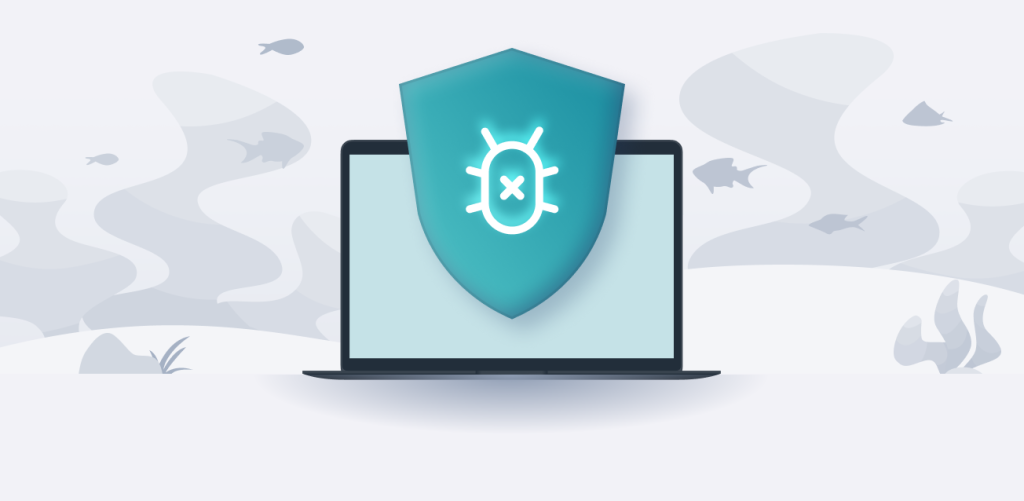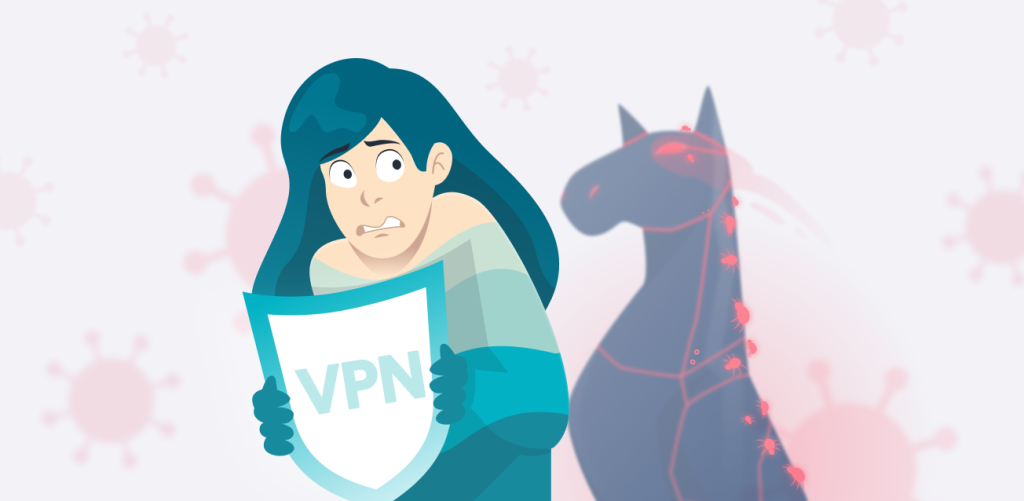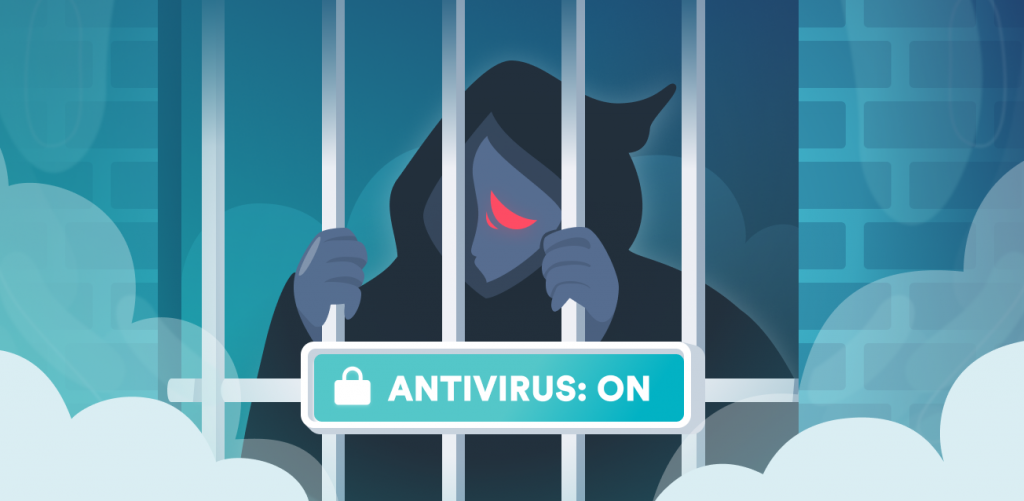
They told you to get an antivirus. But what is an antivirus? Simply put, it’s an app that protects your device from viruses and other malicious software. An antivirus helps you keep your computers, phones, and tablets functional. It keeps your photographs, documents, and other data secured from theft. It also secures your camera and microphone. So that’s the short version of it. Read on to find out more about antivirus software and how it does its magic.
Table of contents
What does antivirus software do?
Antivirus programs, by definition, work against viruses and other forms of malware. As you download and install an antivirus app, you give it a lot of control over your system. And this control allows it to scan and combat all sorts of nasty stuff cybercriminals throw at you. Here’s how it works:
- Passive scans work in the background without your input. It scans files you’re downloading, apps you’re opening, and more for malicious software;
- Active scans are ordered (and scheduled) by you. They can be very deep, scanning your entire computer (or other devices), and they’ll even uncover those infected files that haven’t been activated yet;
- Additional features include checking whether your email logins have been leaked, etc.
Once antivirus software detects a virus (or other malware), you are given several choices:
- Deleting the virus – deletes the infected file permanently;
- Quarantining – deletes the original infected file and creates a copy in a hidden folder where it can’t affect the system processes to deal with it later;
- Adding an exception – if you know or at least believe that antivirus software has detected a false positive (that is, it’s not a computer virus, but the antivirus app mistook it for one), you can tell the antivirus to ignore it.
Antivirus software programs download frequent updates that inform the app of the newest threats on the market to ensure their protection is always on top. Therefore, updating your antivirus program is even more important than updating your regular apps.
Types of antivirus protection
There are many antivirus software brands out there, but there aren’t that many types of antivirus protection. We’ll list them below, but you must know one thing – many antivirus software programs these days combine several (if not all) of the listed types. Relying on a single one of the types would make the AV software woefully ineffective.
Malware signature detection | Heuristic detection |
|---|---|
Also known as “malware signature antivirus,” this is the oldest, most basic type. It checks virus signatures - that is, the code of the suspect file. The app’s database contains the descriptions of known computer viruses and other malicious software, and it can match the code snippets in the database to the code of suspect files. It’s like holding up a photograph of a criminal next to a suspect to see if the faces match. | A more advanced version of signature detection. It exists to combat polymorphic malware - viruses (and more) that change their code to avoid detection. So instead of looking for exact matches, the heuristic analysis looks for snaps of malicious code that match malware behaviors. It’s like catching a criminal by identifying that they wear face masks, hold lockpicks, and carry a big bag with a dollar sign. |
Behavior analysis | Machine learning detection |
Sometimes called “system monitoring antivirus,” it goes a level above heuristic analysis. Instead of comparing code snippets, behavior analysis looks for suspicious activities in suspect files. Such behaviors can include initiating downloads, deleting lots of files, spawning processes, and accessing registry or terminal/command prompt. However, even legit apps carry out those operations from time to time, so it can lead to false positives (Steam players will relate). Nevertheless, it’s more adaptive than heuristics. This one is closer to catching a criminal by observing them climb through a window they have previously unlocked by cutting a perfectly circular hole in the glass. | Aka “machine learning antivirus,” it’s a way of detecting new threats sooner. It uses cloud services to observe the software users’ devices and compile notes on which files act in what suspicious fashion. It’s like a bunch of investigators determining that people climbing through windows at night are 99% more likely to steal a TV. |
I shall repeat myself – a good antivirus app will employ most if not all of these methods. As such, searching for an app by looking at antivirus software types is kind of pointless.
What is not pointless is getting an antivirus app to protect your device.
Is antivirus necessary?
Antivirus software is necessary for anyone who uses a device capable of installing such an app. Your laptops, desktops, mobile devices, and tablets are all susceptible to viruses, worms, trojans, and other forms of malware. Antivirus is necessary to:
- Clean up your device from existing malware;
- Catch viruses and other threats as they try to act;
- Prevent the spread of worms;
- Keep your security measures up-to-date;
- Prevent your data from being stolen;
- Secure webcams and microphones from unauthorized access;
- Keep your device running by stopping ransomware from locking it up;
- Scan portable data storage for threats;
- Have a protective measure working quietly in the background;
- Provide other protective measures like scanning emails.
One researcher documented 5.6 billion malware attacks in 2021 – and while some hail this as a decrease, the experts claim that the number may be higher as more people work from home, away from the prying eyes of corporate cybersecurity. To keep yourself and your browsing safe, you have to find an antivirus app.
What antivirus should I use?
The obvious answer for whoever is reading this blog is Surfshark Antivirus: you’d think I’d promote someone else? Get real!
On a less flippant note, here’s how you choose an antivirus to use:
- Read the reviews: trusty websites like CNET constantly review software – including antivirus;
- Check the news: if an antivirus company or app is up to shenanigans, someone has already noticed it;
- Look for real-time shields: a good antivirus is always on, always watching.
- Inspect additional features: cloud-based services and scheduled scans are a must.
- Be mindful of free offers: unlike with free VPNs (Virtual Private Networks), legitimate free antivirus software apps exist – and not only as trial versions;
- Don’t fall for scare tactics: if you ever see a banner warning you have viruses and need to install an antivirus app, that’s a scam – don’t click on it.
With this knowledge at hand, you’re ready to get the antivirus app that will keep you safe.
In conclusion: antivirus is a necessity
At the end of the day, you need an antivirus on your devices. Hackers aren’t getting any less inventive in the ways of making a profit out of you. That means you shouldn’t abandon cyber defense either. So why not start by getting an antivirus?
FAQ
What is an antivirus?
An antivirus is a piece of software designed to combat viruses and other malware.
What is an example of an antivirus?
Surfshark Antivirus is an example of antivirus software. It has real-time shields and other things you’d want an antivirus to have.
Why is it called an antivirus?
Antivirus is called so because viruses were probably the first form of computer malware, and the way they spread by replicating themselves is close to how biological viruses operate. Later on, cybercriminals would invent a lot of other types, but the name remained.



